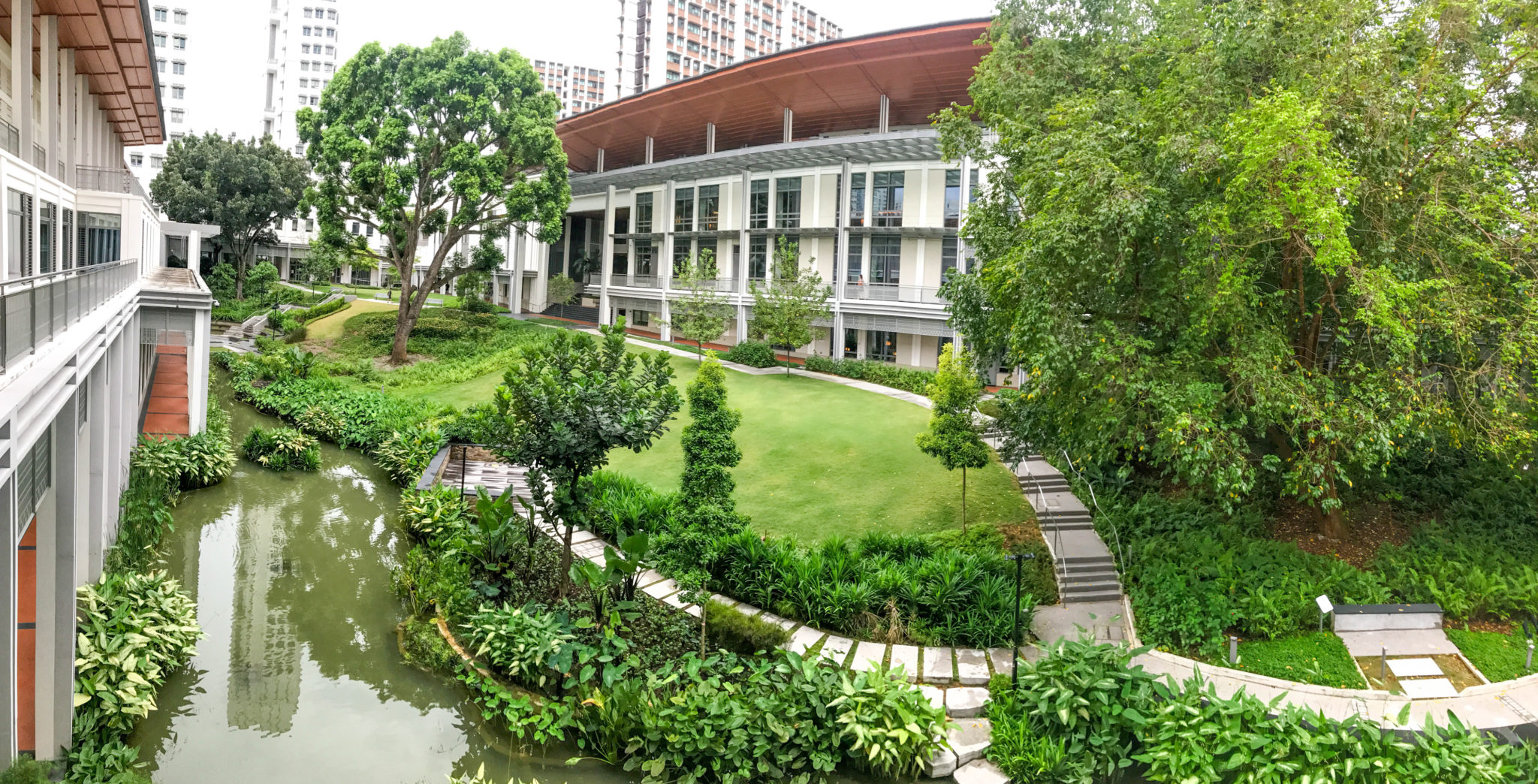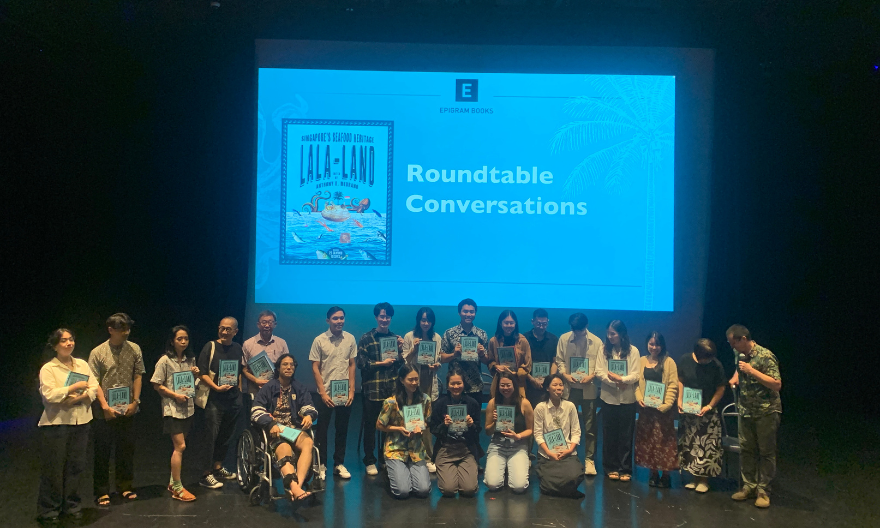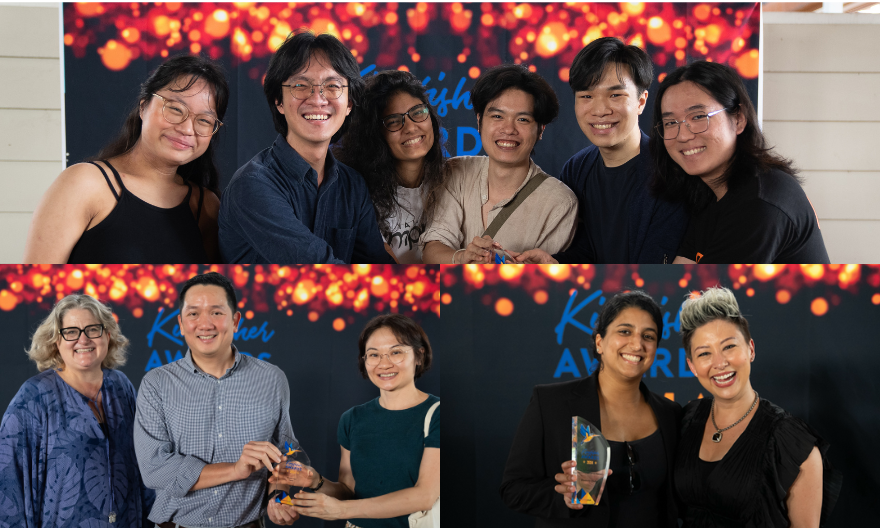Yale-NUS College re-certified for BCA Green Mark Platinum Award
The Yale-NUS College campus has received re-certification for its Green Mark Platinum award, the highest honour for ‘green’ buildings bestowed by Singapore’s Building and Construction Authority (BCA).
Re-certification, a rigorous multi-step process that the College began preparing for in 2016, recognises its sustained performance in the area of energy and water efficiency, operations and management, and indoor environment quality.
“I am proud of the work the College has done to ensure Green Mark Platinum status,” said Kristen Lynas, Executive Vice President of Administration. “It’s a reflection of our community’s ongoing commitment and effort to respect the environment and conserve resources in a sustainable way.”
 Image by Yale-NUS College.
Image by Yale-NUS College.
The BCA first certified the 63,000 square-metre College in 2013, as it was being built. Designed by Forum Architects of Singapore and Pelli Clarke Pelli of New Haven in the United States, the campus has lush courtyards, green roofs and sky gardens that not only provide shade and ventilation, but also reduce the urban heat gain effect.
The design also includes mixed modes of ventilation and control to lessen the burden on the College’s cooling load requirements; a reliance on natural lighting as much as possible; an integrated facilities booking system to control air-conditioning for classrooms; and a demand-controlled ventilation system for offices and lecture theatres.
Another green feature is the stormwater treatment system in which bioretention swales within the campus clean and convey surface runoff into a central biofiltration-pond, which then filters the water and holds it until it overflows into drains run by the PUB, Singapore’s national water agency.
The College’s re-certification is the latest achievement in its ongoing efforts to be green and sustainable. In 2014, Yale-NUS was the first educational institution to receive the Landscape Excellence Assessment Framework (LEAF) certification given out by the National Parks Board in recognition of its ecologically friendly landscapes. In 2017, the College was LEAF re-certified after it demonstrated commitment in the area of landscape management. In the past year, the College has continued to improve the landscape, most notably to the biofiltration pond, in which new surface skimmers and UV lights were installed to reduce the presence of algae. Work was also done to improve water re-circulation and distribution.
In 2016, a year after the campus was officially inaugurated, it received the prestigious International Architecture Award. Organisers praised the winners for demonstrating “a new and growing sensitivity to true human-based design and a sympathetic approach to sustainability and the environment.”
Dennis Aw, director of Infrastructure, Safety, & Security, said the College “is managing resources —time, labour and materials — optimally to support the overall effort to be environmentally sustainable.”
He shared that the student population increased by about 20 percent in the last two academic years but electricity consumption inched up by only 2.6 percent. Successfully managing increases in energy usage is contingent on a number of factors, Mr Aw said. They include schedules for planned and corrective maintenance, the effective use of labour resources, and raising community awareness about air-conditioning operations and temperature controls as a way to help stem wastage of resources.
“This is where the value of managing campus operations is put to the real test under dynamic conditions. Success involves the community as a whole to embrace sustainability,” he said.
Examples of some other steps Yale-NUS has taken this academic year include:
CAMPUS INITIATIVES
- Tracking bacteria and pollutant levels across the campus to ensure a healthy community.
- Redesigning the air-conditioning in faculty offices in all Residential Colleges to sense temperature more accurately, improve circulation and save energy.
- Working with the College’s dining operator to review electricity, water and gas consumption regularly to ensure cost and usage efficiency.
- Rolling out an app that allows the College community to report system or equipment failures so they don’t operate at inefficient energy levels.
STAFF AND FACULTY INITIATIVES
- Requesting that all departments use recycled or biodegradable tableware for catering events.
- Giving water bottles to staff as birthday gifts as the College strongly discourages the use of bottled water.
- Reducing paper usage by encouraging the use of electronic documents.
- Encouraging the College community to bring their own washable tableware to College events.
STUDENT INITIATIVES
- Supporting food waste management by ensuring that food waste is collected for composting for on-campus farm, as well as supporting communications between the College’s dining operator and student groups to help minimise food waste at events.
- Creating a community of urban farmers and growing a pesticide-free garden next to the Cendana Common Lounge with edible plants like butterfly pea flowers, papaya, kang kong, French beans, mulberry, mint leaves and lemongrass. Also established a composting system for the garden using fruit and other organic waste collected from dining halls.
- Implementing a checklist and working to raise awareness of the list to ensure that all events on campus are organised sustainably.
- Forming a “Conscious Living Collective” that focuses on peer learning and creative strategies for the promotion of ethical lifestyle choices every day. Emphasis this semester is on ethical fashion.





